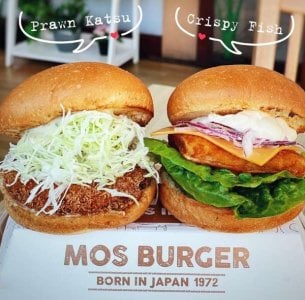International food chain MOS Burger ceases operations in Australia
By
Danielle F.
- Replies 6
Australia has been a hub for homegrown and international flavours.
As several food chains from around the world started their operations in The Land Down Under, some chains also made the difficult decision to close shop.
Burger enthusiasts will soon have to say goodbye to a unique dining option that has been part of their culinary adventures.
MOS Burger, famous for its distinctive offerings that blend traditional burgers with Japanese flavours, took to social media to share heartbreaking news with its loyal customers.
'After much consideration, we have made the difficult decision to close all MOS Burger locations in Australia,' they wrote in a post.
'Our last day of trading will be 31 August 2024.'
The company also expressed its heartfelt gratitude towards their Australian fans.
'Thank you for making MOS Burger a special place in Australia. We hope to continue spreading happiness and great food wherever the MOS Burger journey takes us next.'
MOS Burger's Australia branches—Sunnybank, Southport, and Upper Mount Gravatt—have made an impact since the first store opened in April 2011.
Burger fans can still enjoy MOS Burger's dishes at the Australia Fair Shopping Centre until 30 August.
Their Garden City and Sunnybank branches will be open until 31 August.
Originating from Japan in 1972, MOS Burger became a formidable name in the fast food industry, as it competed with giants like McDonald's.
MOS Burger boasts over 1,300 stores in Japan and 400 branches across Asia.
The acronym MOS stands for 'Mountain, Ocean, and Sun', reflecting the company's commitment to high-quality ingredients and connection to nature.
News about MOS Burger's closure surprised many customers.
Some expressed their disappointment on social media and lamented about the missed opportunity to have MOS Burger in other states and territories.
'I love MOS Burger. Please don't leave Australia forever,' one customer shared.
'I drove to the other side of town just to go to you.'
'What? I've been waiting for years for MOS burger to come to Perth, and now you're leaving Australia completely?' another expressed their dismay.
While MOS Burger did not specify the reasons behind its exit, fast food chains have been grappling with rising operational costs and consumers feeling the cost-of-living pressures.
Global fast-food giant McDonald's recently reported a drop in sales for the first time since the pandemic began.
McDonald's Chief Executive Officer Chris Kempczinski noted that lower-income families have been 'dropping out of the market, eating at home and finding other ways to economise'.
As MOS Burger prepares to close its doors in Australia, fans of the chain could visit their stores this week.
It's a chance to relive memories and enjoy the unique flavours that MOS Burger brought to the Australian fast food scene.

Have you seen other fast-food establishments shut down in your area? Share your thoughts about the changing fast food industry in the comments section below.
As several food chains from around the world started their operations in The Land Down Under, some chains also made the difficult decision to close shop.
Burger enthusiasts will soon have to say goodbye to a unique dining option that has been part of their culinary adventures.
MOS Burger, famous for its distinctive offerings that blend traditional burgers with Japanese flavours, took to social media to share heartbreaking news with its loyal customers.
'After much consideration, we have made the difficult decision to close all MOS Burger locations in Australia,' they wrote in a post.
'Our last day of trading will be 31 August 2024.'
The company also expressed its heartfelt gratitude towards their Australian fans.
'Thank you for making MOS Burger a special place in Australia. We hope to continue spreading happiness and great food wherever the MOS Burger journey takes us next.'
MOS Burger's Australia branches—Sunnybank, Southport, and Upper Mount Gravatt—have made an impact since the first store opened in April 2011.
Burger fans can still enjoy MOS Burger's dishes at the Australia Fair Shopping Centre until 30 August.
Their Garden City and Sunnybank branches will be open until 31 August.
Originating from Japan in 1972, MOS Burger became a formidable name in the fast food industry, as it competed with giants like McDonald's.
MOS Burger boasts over 1,300 stores in Japan and 400 branches across Asia.
The acronym MOS stands for 'Mountain, Ocean, and Sun', reflecting the company's commitment to high-quality ingredients and connection to nature.
News about MOS Burger's closure surprised many customers.
Some expressed their disappointment on social media and lamented about the missed opportunity to have MOS Burger in other states and territories.
'I love MOS Burger. Please don't leave Australia forever,' one customer shared.
'I drove to the other side of town just to go to you.'
'What? I've been waiting for years for MOS burger to come to Perth, and now you're leaving Australia completely?' another expressed their dismay.
While MOS Burger did not specify the reasons behind its exit, fast food chains have been grappling with rising operational costs and consumers feeling the cost-of-living pressures.
Global fast-food giant McDonald's recently reported a drop in sales for the first time since the pandemic began.
McDonald's Chief Executive Officer Chris Kempczinski noted that lower-income families have been 'dropping out of the market, eating at home and finding other ways to economise'.
As MOS Burger prepares to close its doors in Australia, fans of the chain could visit their stores this week.
It's a chance to relive memories and enjoy the unique flavours that MOS Burger brought to the Australian fast food scene.
Key Takeaways
- MOS Burger Australia announced its closure of Australian stores by the end of August.
- The company expressed its gratitude for the support from customers and cherished memories over the years.
- MOS Burger has three locations in Queensland, and fans have expressed disappointment over the closure.
- The fast-food industry, in general, faced challenges such as increased operating costs and customers affected by cost-of-living pressures.








